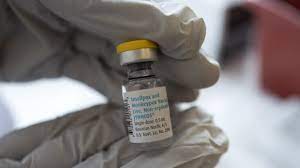FDA Approves Emergency Use Of Intradermal Vaccine For Monkeypox Treatment
The United States Food and Drug Administration has issued an emergency use authorisation for Jynneos vaccine to increase the existing monkeypox vaccine supply.
The FDA said the approved vaccine will enable healthcare providers to use the intradermal injection and this will increase the total number of doses available for use by up to five-fold.
It stated that the emergency use authorisation allows for use of the vaccine in people who are 18 years and older, and in people seen to be at high risk of monkeypox infection.
The regulatory agency disclosed this on Tuesday, in a statement made available on its official website.
Jynneos vaccine was approved in 2019 for the prevention of smallpox and monkeypox disease in individuals 18 years of age and older determined to be at high risk for smallpox or monkeypox infection.
The FDA explained that the Jynneos monkeypox vaccine is administered under the skin (subcutaneously) in two doses, given 28 days apart, and also for individuals 18 years of age and older determined to be at high risk of monkeypox infection.
The vaccine is administered between the layers of the skin (intradermally) and two doses of the vaccine given 28 days apart will still be required.
“There are no data available to indicate that one dose of JYNNEOS will provide long-lasting protection, which will be needed to control the current monkeypox outbreak,” it said.
The FDA Commissioner, Robert M. Califf said, “In recent weeks the monkeypox virus has continued to spread at a rate that has made it clear our current vaccine supply will not meet the current demand.
“The FDA quickly explored other scientifically appropriate options to facilitate access to the vaccine for all impacted individuals. By increasing the number of available doses, more individuals who want to be vaccinated against monkeypox will now have the opportunity to do so.”
Data from a clinical study conducted in 2015 on the Jynneos vaccine assessed a two-dose series given intradermally compared to subcutaneously. Participants who received the vaccine intradermally received a lower volume (one-fifth) than individuals who received the vaccine subcutaneously.
“The results of this study demonstrated that intradermal administration produced a similar immune response to subcutaneous administration, meaning individuals in both groups responded to vaccination in a similar way.
“Administration by the intradermal route resulted in more redness, firmness, itchiness, and swelling at the injection site, but less pain and these side effects were manageable.
“The FDA has determined that the known and potential benefits of JYNNEOS outweigh the known and potential risks for the authorised uses,” it said.
In addition, “To support the FDA’s authorisation of two doses of Jynneos administered by the subcutaneous route of administration in individuals younger than 18 years of age, the FDA considered the available Jynneos safety and immune response data in adults as well as the historical data with the use of live vaccinia virus smallpox vaccine in paediatric populations.
“Jynneos has been tested in individuals with immunocompromising conditions and has been found to be safe and effective in the trials that were performed to support approval. It was initially developed specifically as an alternative for use in immunocompromised individuals in the event of a smallpox outbreak.”
“The FDA will provide updates as developments occur and will continue to work with federal public health partners and industry to ensure timely access to all available medical countermeasures. More information can be found on the agency’s monkeypox webpage,” it said.



Comments are closed.